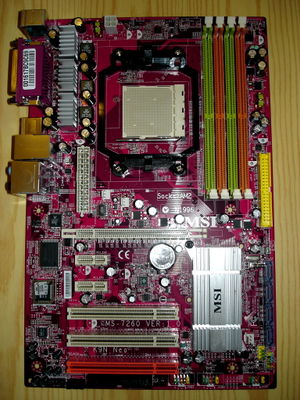Board:msi/ms7260: Difference between revisions
(→Status: PCI add-on card issues are fixed. More details on RAM issue.) |
(SATA works fine on the K9N Neo.) |
||
| Line 37: | Line 37: | ||
|- bgcolor="#eeeeee" valign="top" | |- bgcolor="#eeeeee" valign="top" | ||
| SATA | | SATA | ||
| style="background: | | style="background:lime" | Works | ||
| | | Tested with a 40 GB SATA disk, connected to the "SATA1" connector of the board (there are four). Works with '''hde2:/vmlinuz initrd=/initrd.img root=/dev/sda2''' in [[FILO]] (my Linux partition is /dev/sda2). Mounting the drive also works fine when you don't boot from SATA (e.g. from IDE or via [[etherboot]]). | ||
|- bgcolor="#eeeeee" valign="top" | |- bgcolor="#eeeeee" valign="top" | ||
| USB | | USB | ||
| Line 126: | Line 126: | ||
* Test the devices marked as "Untested" in the above status table. | * Test the devices marked as "Untested" in the above status table. | ||
* Fix flashrom to also work when the board is booted using the proprietary BIOS. | * Fix flashrom to also work when the board is booted using the proprietary BIOS. | ||
{{GPL}} | {{GPL}} | ||
Revision as of 20:07, 12 October 2007

This page describes how to use LinuxBIOS on the MSI MS-7260 (K9N Neo) mainboard. It is maintained by Uwe Hermann.
The mainboard
Some more information on the board is available in the mailing list archives.
So far we have verified that revision 1.0 of the mainboard has a socketed PLCC32 ROM chip (512KB).
If you have any other revision of the board, please contact us on the mailing list and let us know if it has a socketed (and PLCC-type) ROM chip.
Status
| Device/functionality | Status | Comments |
|---|---|---|
| CPU | Works | I'm using an AMD Athlon 64 X2 Dual Core Processor 3600+, both cores work fine. |
| RAM | Works | It seems some combinations of DIMMs and RAM slots don't work. Using only one DIMM (in slot 1) works for me. |
| IDE | Works | — |
| IDE using CF-to-IDE adapter | Works | — |
| SATA | Works | Tested with a 40 GB SATA disk, connected to the "SATA1" connector of the board (there are four). Works with hde2:/vmlinuz initrd=/initrd.img root=/dev/sda2 in FILO (my Linux partition is /dev/sda2). Mounting the drive also works fine when you don't boot from SATA (e.g. from IDE or via etherboot). |
| USB | Works | Tested: USB thumb drive, USB keyboard, USB webcam, USB DVB-T adapter. |
| On-board ethernet | Works | — |
| On-board audio | Works | — |
| PCI add-on cards | Works | There were some problems with PCI add-on cards, but they're fixed as of svn revision 2807. |
| PCI Express add-on cards | Untested | — |
| Floppy | Untested | — |
| Serial port (COM1) | Works | — |
| Parallel port | Untested | — |
| PS/2 keyboard | Untested | — |
| PS/2 mouse | Untested | — |
| Mainboard sensors/fans | Works | The k8temp module loads fine, the sensors tool outputs the CPU temperature (both cores in my case) correctly. |
| CPU frequency scaling / powersave modes | Untested | Probably won't work as long as there's no ACPI implementation for this board(?) |
| Flashrom | Works | Currently Flashrom works fine with LinuxBIOS, but it does not yet work with the proprietary BIOS. |
| X11 | Works | Tested using a VGA add-on card (PCI). |
Building LinuxBIOS
Build a LinuxBIOS payload, e.g. FILO, and copy the resulting file to /tmp/filo.elf.
$ cp payload.file /tmp/filo.elf
Checkout LinuxBIOS:
$ svn co svn://linuxbios.org/repos/trunk/LinuxBIOSv2
Build the LinuxBIOS image, containing the payload.
$ cd LinuxBIOSv2/targets $ ./buildtarget msi/ms7260 $ cd msi/ms7260/ms7260 $ make
Write the LinuxBIOS image onto your ROM chip using flashrom:
$ flashrom -wv linuxbios.rom
Note: At the moment flashrom does not work in the MS-7260 (when booted using the original BIOS). Thus, I'm flashing the ROM chip in a different mainboard where flashrom works. However, flashrom works just fine once the MS-7260 is booted using LinuxBIOS.
TODO
- Test the devices marked as "Untested" in the above status table.
- Fix flashrom to also work when the board is booted using the proprietary BIOS.

|
This work is free software; you can redistribute it and/or modify it under the terms of the GNU General Public License as published by the Free Software Foundation; either version 2 of the License, or any later version. This work is distributed in the hope that it will be useful, but WITHOUT ANY WARRANTY; without even the implied warranty of MERCHANTABILITY or FITNESS FOR A PARTICULAR PURPOSE. See the GNU General Public License for more details. |